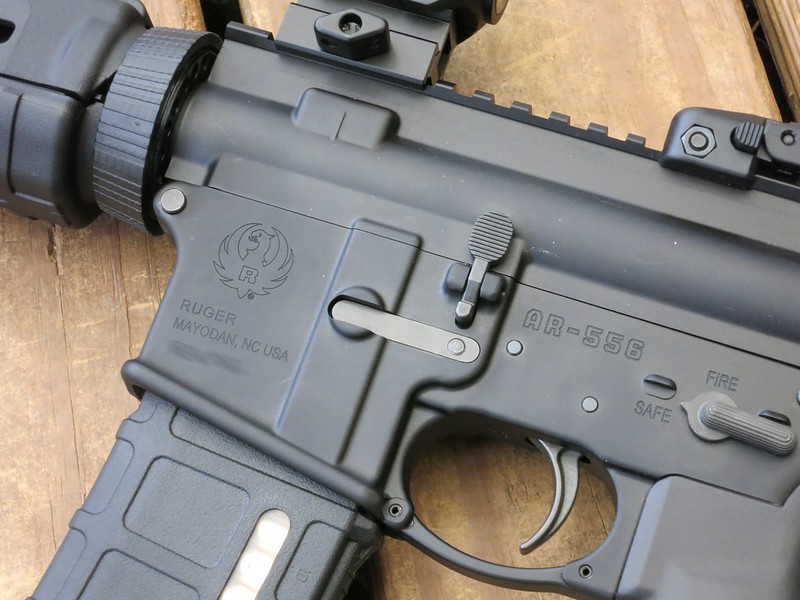On January 31, officials representing 13 US states and dozens of counties, advocates and others submitted official statements in support of an historic lawsuit brought by Mexico’s government against US gun manufacturers.
The lawsuit, originally filed in August 2021, is seeking $10 billion in damages in a Massachusetts federal court from major gunmakers including Smith & Wesson, Colt’s, Glock and Ruger. It alleges that negligent business practices have led to “deadly flood of military-style” guns south of the border—causing many deaths associated with the drug war. It adds that the companies are “actively facilitating the unlawful trafficking of their guns to drug cartels and other criminals in Mexico.”
“Defendants design, market, distribute, and sell guns in ways they know routinely arm the drug cartels in Mexico,” the lawsuit reads, citing the companies’ networks of gun dealers and shops and their construction of semi-automatic guns that can be modified to become effectively fully automatic.
The Mexican government claims that half a million guns are smuggled from the US every year.
Attorneys general for states including California, New York, Illinois, Massachusetts and New Jersey filed an amicus brief supporting Mexico’s lawsuit. The District of Columbia and district attorneys representing dozens of jurisdictions including numerous major cities additionally filed in support—citing gun violence in these cities and overdoses caused in part by drugs trafficked from Mexico.
A central issue in the case is whether a United States federal gun law applies to disputes involving international actors. Called the Protection of Lawful Commerce in Arms Act (PLCAA), it was passed by Congress in 2005. The PLCAA effectively shields gun and ammunition companies from liability when their products are used in crimes. Because of it, lawsuits brought against manufacturers are usually dismissed before going to trial.
An exception to the PLCAA is when gun companies knowingly break the law to market or sell their products. The city of Gary, Indiana has an active lawsuit against gun companies, accusing them of violating public nuisance laws and fueling violence there. And victims of the 2012 Sandy Hook elementary school shooting have sued several companies, alleging that they unlawfully marketed the guns used.
The Mexican government claims that half a million guns are smuggled from the US every year. Its lawsuit states that between 70-90 percent of guns recovered at crime scenes are trafficked from the US. A February 2021 report from the US Government Accountability Office supports this, finding that 70 percent of firearms recovered in Mexico between 2014-2018 and submitted for tracing were linked back to the US.
“The United States does have a great responsibility in the trafficking of arms and the violence in Mexico,” said journalist Ioan Grillo, author of Blood Gun Money, in an interview for Telemundo. “Although the Mexican government must improve a lot, the influence of weapons that arrive through the border cannot be denied … Manufacturers have to take responsibility and see why their products are getting into the hands of the cartels.”
When drug prohibition is known to fuel violence, couldn’t legalizing drugs significantly address this problem?
The lawsuit faces significant challenges, given the political clout of the gun industry and courts’ usual attitude. But when drug prohibition is known to fuel violence, a related question occurs. Couldn’t legalizing the drugs that supply the illicit-market profits that incentivize gun purchases significantly address this problem? Disputes between legal drug sellers tend to be settled not by guns, but in court.
In June 2021, the Mexican Supreme Court effectively legalized home cultivation of cannabis by adults for personal use, by permit. Yet because of inaction by Congress, there is still no legal commercial cannabis market.
Mexico could also move to legalize other drugs produced and traded there, like cocaine, methamphetamine, heroin and fentanyl. However, most drugs that are produced in or trafficked through Mexico are not destined for domestic consumption, but rather for US consumers.
If drugs were legalized in Mexico without similar changes to US federal laws, that trade would remain illegal, sustaining an illicit market for suppliers. And incentives would remain strong for Mexicans to work in the lowest rungs of the illicit drug trade in a country where nearly half the population falls below the federal poverty line.
With entrenched inequalities, there’s so much more that governments would need to do.
Besides which, a legal, regulated drug market could only work with effective rule of law and governance. Police forces in Mexico regularly commit abuses and crimes without being held accountable—including torture, beatings, random detention and obstructing investigations into themselves. Mexican authorities resolve just 1 percent of crimes, as violent crime has surged in the past decade.
The Mexican government’s lawsuit against gun manufacturers could yet play a significant role in reducing deaths. But with entrenched inequalities within and between the neighboring countries, there’s so much more that governments would need to do to end the worst of the drug-war violence.
Photograph by James Case via Flickr/Creative Commons 2.0





Show Comments